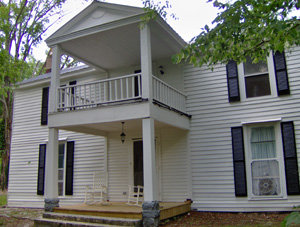
Cannon County
Cannon County was established on January 31, 1836, when the state legislature took portions of Rutherford, Smith, and Warren Counties to create the new county of Cannon, named in honor of Whig Governor Newton Cannon. (Two years later, the legislature added a portion of Wilson County, creating the present county boundaries.) The county's first settlers moved to present-day western Cannon County, around the Readyville and Bradyville areas, during the late 1790s. Hugh P. Brawley operated a grist mill at Brawley Fork as early as 1808.
The first village of any size, however, was Danville, which became the initial county seat. Its name was soon changed to Woodbury to honor Levi Woodbury, the Democratic secretary of the treasury. In 1836 Henry Trott and William Bates laid out new lots for Woodbury, and their plan adapted the earlier linear street plan of Danville into a central courthouse square plan. The present Cannon County Courthouse, built in 1935, features a striking Colonial Revival design by Nashville architect George Waller and is listed in the National Register of Historic Places. Other local properties in the National Register are the Houston House, a vernacular Greek Revival-style I-house associated with Democratic Congressman William C. Houston; the Adams House, the last remaining dormitory of the Baptist Female College and the later home of prominent physician Jesse F. Adams; the Wharton House, a vernacular Queen Anne dwelling from the late nineteenth century; and the Readyville Mill, a nineteenth- and twentieth-century grist mill complex.
Woodbury has always served as the county's seat of government and primary town, but it never had a railroad connection and remained largely isolated from major transportation networks until the completion of the original Memphis-to-Bristol Highway (now U.S. Highway 70S) during the late 1920s. The new highway promoted commercial development; many of the historic stores around the town square date to the 1920s and 1930s. As travelers sped through the county on the new highway, they stimulated the already-established market for white oak baskets and wood furniture on sale at stands and shops along the road. Cannon County is now recognized as an important regional center for folk decorative arts. The new road also spurred local leaders, especially Dr. Jesse F. Adams, to create and invest in new businesses like the Good Samaritan Hospital (early 1930s) and the town's first modern factory, the Armour Cheese Plant, in 1935. After World War II, in 1947, Adams and the Woodbury Lions Club combined forces to convince the Colonial Shirt Corporation to establish a Woodbury factory; a branch factory was later opened in Auburntown. Another key entrepreneur was Selmer Mason Jennings, who used the new highway and his solid business ability to gain a Ford Motor car dealership for the town during the 1920s. Jennings Ford still operates today. Woodbury also is the county's educational center, home to the Laurens Academy and the Baptist Female College during the antebellum era, Woodbury College during the Victorian era, and the public Cannon County High School, which was established in 1920.
Villages in Cannon County include Readyville, Auburntown, Bradyville, and Gassaway. Crisp was a smaller African American village centered around a segregated black school and church.
During the Civil War Cannon County residents raised seven infantry companies for the Confederacy. Union soldiers also came from the county; most served in the Fifth Tennessee Cavalry, which was largely based in Liberty in adjacent DeKalb County. Small skirmishes and reconnaissance movements characterize most of the military activity within the county. Guerrilla warfare also was common. During World War II the maneuvers of the Second Army included parts of Cannon County, and local citizens in Woodbury established a USO center for the soldiers.
Since its creation Cannon County has been Democratic in its political loyalties and has produced two notable party leaders. In the late 1800s and early 1900s William Cannon Houston was the county's most prominent politician. Cannon established the Woodbury newspaper, practiced law, and served in the state legislature as a young man; from 1904 to 1918 he served in the United States Congress and often entertained important southern Democratic leaders at his home on the outskirts of Woodbury. Throughout the mid-1900s Jim Cummings was an influential member of the Tennessee General Assembly. He was first elected to the state legislature in 1929 and stayed there until 1972, except for a four-year stint from 1949 to 1952, when Cummings was secretary of state under Governor Gordon Browning. Cummings was the Speaker of the House during the Eighty-fifth General Assembly. Historian Robert Mason noted that “Mr. Jim” Cummings “evoked the essence of a more gracious, gentler time–of friendly towns and family farms and hills and valleys and country roads.” (1)
The county’s 2000 population was 12,826, an increase of 22 percent since 1990.



